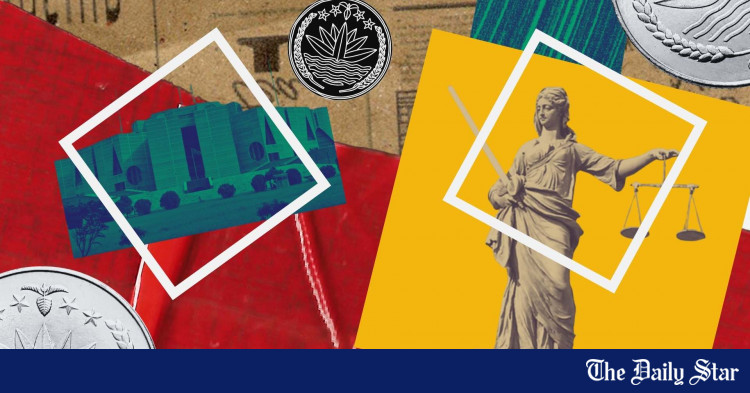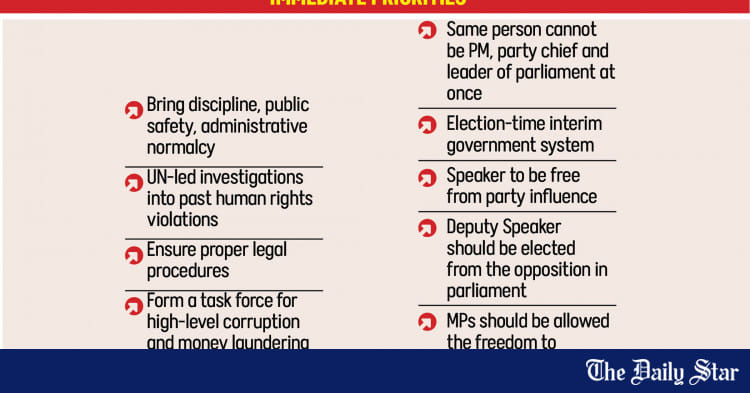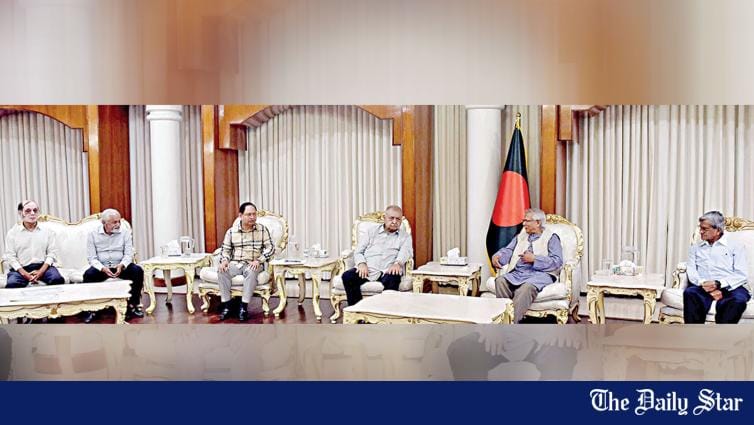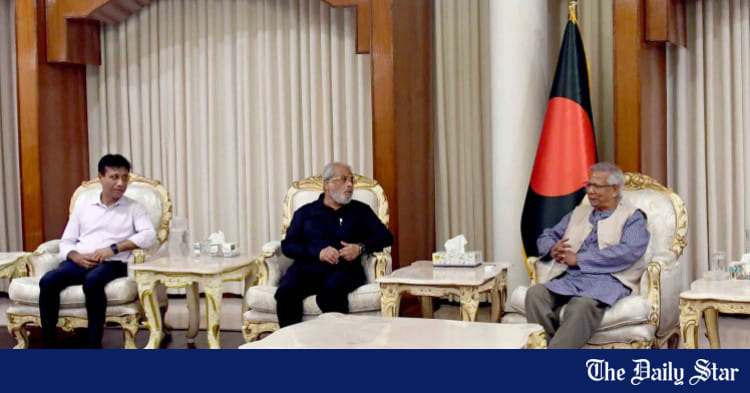Saif
Senior Member
- Messages
- 17,422
- Likes
- 8,377
- Nation

- Residence

- Axis Group


Reforms needed in political parties and the electoral process in Bangladesh
The citizens of Bangladesh have been victims of a frustratingly underperforming democracy for quite a long time.
Reforms needed in political parties and the electoral process in Bangladesh

Individuals ever convicted of financial corruption and homicide by the highest court of Bangladesh will be ineligible to contest any parliamentary election. VISUAL: STAR
The citizens of Bangladesh have been victims of a frustratingly underperforming democracy for quite a long time. As one of the ordinary citizens, I feel that the interim government should immediately take up the measure of dialogue among the relevant stakeholders to bring about substantial reform in the practices of the political parties.
To foster a more vibrant political landscape, each party should be required to develop and maintain a core agenda that differentiates it from others. Currently, many political parties pursue the same agenda. Often a new party is born from a faction of an existing party with no distinctly different agenda.
Political parties should hold a council every two years to elect their top leaders for the subsequent term. Regular leadership elections would prevent stagnation from long-serving leaders and provide opportunities for new voices and ideas to emerge. Currently, most political parties are like proprietorship concerns, where top leaders are irreplaceable until their death. Under their folds, other leaders can hardly emerge, and consequently, with the top leader's death, the parties suffer from a leadership crisis.
Relevant council proceedings must be reported to the National Election Commission, and any party failing to hold two subsequent councils will not qualify for the next national election.
To prevent power consolidation, no individual should be allowed to hold the same leadership position for two consecutive terms or more than five terms in a lifetime. By regularly introducing new leadership, parties can benefit from fresh perspectives and innovative approaches. The leaders, ineligible for holding any top positions, can be included in the advisory council of that party.
Barring individuals from holding both party positions and government roles simultaneously is essential to reducing conflicts of interest and promoting a clearer distinction between party politics and governance. Currently, there is almost no difference between the positions at the party and the government, and in effect, the party is mired in government. Once out of government, the party is in extreme disarray and shambles.
To curb nepotism, the position of a departing party leader should not be filled by a close relative—first-blood relatives, spouses, and spouses of the first-blood relatives—for ten years. This reform would reduce the likelihood of dynastic succession and encourage a merit-based approach to leadership selection.
There should be rules preventing close relatives of retiring members of parliament from contesting for parliamentary positions within the same party. By ensuring no first-blood relatives as well as the spouses of a retired member can run for a parliamentary seat from the same party, parties can promote broader democratic participation and reduce the potential for entrenched political networks.
Also, both structural and procedural issues are needed to promote a more robust and representative democratic process.
In the direct voting process, parties' total votes and the number of winning Members of Parliament (MPs) are not actually representative. A party that receives 35 percent of the total votes in the country may win more than 150 of the 300 seats in parliament and form government. However, immediately shifting to proportional representation may be an unpopular proposition among political parties. As a first step, a hybrid electoral system that combines direct elections and proportional representation will assist people in becoming accustomed to the process.
Out of a total of 350, including 50 for women, parliamentary seats, 200 would be elected directly by the voters in their constituencies. The individual getting the most votes will be the MP for the concerned constituencies. The remaining 150 seats would be allocated based on proportional representation. The number of seats each political party receives would correspond to the percentage of total votes they receive in the whole country. This approach ensures that smaller parties are not left out of their representation in parliament. Proportional representation will increase the chance of eminent citizens, journalists, intellectuals, professionals, different ethnic and minority representatives, as well as politicians, being in parliament.
Of the 150 total seats for proportional representation, a maximum of 30 will be reserved for women. A party getting women MPs through direct voting will get the same number of women MPs from the 150 seats reserved for proportionate representation. However, the total number of women MPs in the reserved seat will not exceed 30. Even religion-based parties will have to engage and get directly elected women MPs to get their share of the reserved seats. Women MPs will fetch more women in the parliament, which will be more dignifying for them than the current process.
Parties or independent candidates receiving less than a specified minimum percentage of votes, 0.5 percent in the direct elections may club together to be eligible to participate in the proportional representation segment. This provision allows smaller parties to collaborate post-election and nominate a representative of their choice from the list declared before the election. However, there can be a requirement of getting minimum threshold votes, say 0.1 percent, for a party or an independent candidate to be eligible to join the club.
The role of the MPs will have to be designed to be more meaningful. MPs will concentrate solely on national-level policy-making and state issues, excluding involvement in local government activities. They cannot hold positions in political parties while in office, and they will be ineligible for such roles for two years even after the MP tenure ends. This separation is needed to prevent conflicts of interest and ensure that MPs are focused on their core responsibilities.
No first-blood relative of an MP can contest for the same constituency from the same party for ten years after the MP's term ends. Additionally, no MP can contest from the same constituency more than three times, whether elected into parliament or not. Also, an individual cannot serve more than two terms as prime minister in their lifetime.
The president of Bangladesh will be elected directly by the people to enhance the position's credibility and impartiality. Additionally, the speaker of parliament will be directly elected by at least 200 out of the 350 votes cast by the MPs. Among the deputy speakers, one must be from the opposition, and one must represent women or minorities. At least half of parliamentary committees must be headed by MPs from opposition parties.
Local government elections, such as those for upazila and union council representatives, should be conducted without the involvement of political parties. By removing party influence, the focus can shift entirely to the individual candidates and their qualifications, fostering a more community-centred and accountable local government.
Individuals ever convicted of financial corruption and homicide by the highest court of Bangladesh will be ineligible to contest any parliamentary election. The measure of deterring the convicted ones from contesting the election can significantly increase the probability of morally pure individuals representing the people in parliament.
Mohammad Abdul Hannan is deputy general manager at IDLC Finance PLC.
Individuals ever convicted of financial corruption and homicide by the highest court of Bangladesh will be ineligible to contest any parliamentary election. VISUAL: STAR
The citizens of Bangladesh have been victims of a frustratingly underperforming democracy for quite a long time. As one of the ordinary citizens, I feel that the interim government should immediately take up the measure of dialogue among the relevant stakeholders to bring about substantial reform in the practices of the political parties.
To foster a more vibrant political landscape, each party should be required to develop and maintain a core agenda that differentiates it from others. Currently, many political parties pursue the same agenda. Often a new party is born from a faction of an existing party with no distinctly different agenda.
Political parties should hold a council every two years to elect their top leaders for the subsequent term. Regular leadership elections would prevent stagnation from long-serving leaders and provide opportunities for new voices and ideas to emerge. Currently, most political parties are like proprietorship concerns, where top leaders are irreplaceable until their death. Under their folds, other leaders can hardly emerge, and consequently, with the top leader's death, the parties suffer from a leadership crisis.
Relevant council proceedings must be reported to the National Election Commission, and any party failing to hold two subsequent councils will not qualify for the next national election.
To prevent power consolidation, no individual should be allowed to hold the same leadership position for two consecutive terms or more than five terms in a lifetime. By regularly introducing new leadership, parties can benefit from fresh perspectives and innovative approaches. The leaders, ineligible for holding any top positions, can be included in the advisory council of that party.
Barring individuals from holding both party positions and government roles simultaneously is essential to reducing conflicts of interest and promoting a clearer distinction between party politics and governance. Currently, there is almost no difference between the positions at the party and the government, and in effect, the party is mired in government. Once out of government, the party is in extreme disarray and shambles.
To curb nepotism, the position of a departing party leader should not be filled by a close relative—first-blood relatives, spouses, and spouses of the first-blood relatives—for ten years. This reform would reduce the likelihood of dynastic succession and encourage a merit-based approach to leadership selection.
There should be rules preventing close relatives of retiring members of parliament from contesting for parliamentary positions within the same party. By ensuring no first-blood relatives as well as the spouses of a retired member can run for a parliamentary seat from the same party, parties can promote broader democratic participation and reduce the potential for entrenched political networks.
Also, both structural and procedural issues are needed to promote a more robust and representative democratic process.
In the direct voting process, parties' total votes and the number of winning Members of Parliament (MPs) are not actually representative. A party that receives 35 percent of the total votes in the country may win more than 150 of the 300 seats in parliament and form government. However, immediately shifting to proportional representation may be an unpopular proposition among political parties. As a first step, a hybrid electoral system that combines direct elections and proportional representation will assist people in becoming accustomed to the process.
Out of a total of 350, including 50 for women, parliamentary seats, 200 would be elected directly by the voters in their constituencies. The individual getting the most votes will be the MP for the concerned constituencies. The remaining 150 seats would be allocated based on proportional representation. The number of seats each political party receives would correspond to the percentage of total votes they receive in the whole country. This approach ensures that smaller parties are not left out of their representation in parliament. Proportional representation will increase the chance of eminent citizens, journalists, intellectuals, professionals, different ethnic and minority representatives, as well as politicians, being in parliament.
Of the 150 total seats for proportional representation, a maximum of 30 will be reserved for women. A party getting women MPs through direct voting will get the same number of women MPs from the 150 seats reserved for proportionate representation. However, the total number of women MPs in the reserved seat will not exceed 30. Even religion-based parties will have to engage and get directly elected women MPs to get their share of the reserved seats. Women MPs will fetch more women in the parliament, which will be more dignifying for them than the current process.
Parties or independent candidates receiving less than a specified minimum percentage of votes, 0.5 percent in the direct elections may club together to be eligible to participate in the proportional representation segment. This provision allows smaller parties to collaborate post-election and nominate a representative of their choice from the list declared before the election. However, there can be a requirement of getting minimum threshold votes, say 0.1 percent, for a party or an independent candidate to be eligible to join the club.
The role of the MPs will have to be designed to be more meaningful. MPs will concentrate solely on national-level policy-making and state issues, excluding involvement in local government activities. They cannot hold positions in political parties while in office, and they will be ineligible for such roles for two years even after the MP tenure ends. This separation is needed to prevent conflicts of interest and ensure that MPs are focused on their core responsibilities.
No first-blood relative of an MP can contest for the same constituency from the same party for ten years after the MP's term ends. Additionally, no MP can contest from the same constituency more than three times, whether elected into parliament or not. Also, an individual cannot serve more than two terms as prime minister in their lifetime.
The president of Bangladesh will be elected directly by the people to enhance the position's credibility and impartiality. Additionally, the speaker of parliament will be directly elected by at least 200 out of the 350 votes cast by the MPs. Among the deputy speakers, one must be from the opposition, and one must represent women or minorities. At least half of parliamentary committees must be headed by MPs from opposition parties.
Local government elections, such as those for upazila and union council representatives, should be conducted without the involvement of political parties. By removing party influence, the focus can shift entirely to the individual candidates and their qualifications, fostering a more community-centred and accountable local government.
Individuals ever convicted of financial corruption and homicide by the highest court of Bangladesh will be ineligible to contest any parliamentary election. The measure of deterring the convicted ones from contesting the election can significantly increase the probability of morally pure individuals representing the people in parliament.
Mohammad Abdul Hannan is deputy general manager at IDLC Finance PLC.







